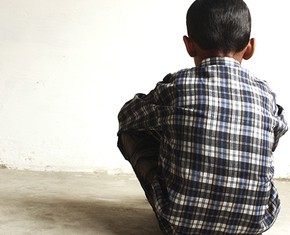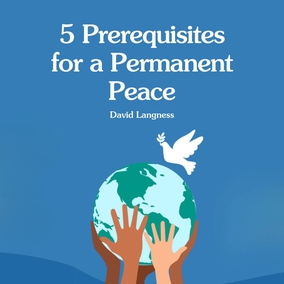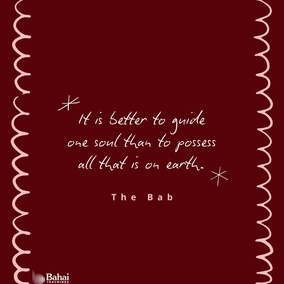The views expressed in our content reflect individual perspectives and do not represent the authoritative views of the Baha'i Faith.
Have you ever heard the phrase “curse like a sailor?” I’m no sailor, but I did get drafted into the Army at 19, and when I came home from combat, I had unconsciously developed some really salty speech.
That tends to happen in war, which is an obscenity itself.
In fact, I suspect those two things, war and vulgarity, are closely related since language replicates action, and war produces the ugliest possible actions. Apparently, bombs and F-bombs go together.
RELATED: Being Courteous in Our Speech
Here’s why, I think: The mostly young people who wage wars often have no real vocabulary to describe the horrors they witness or perpetrate, so they resort to using absurdly high levels of profanity, interjecting multiple vulgarities, expletives, slurs, obscenities, cuss words, and curses into literally every spoken sentence. I am not exaggerating.
In the war I constantly heard the foulest imaginable terms — and some you probably can’t imagine — used variously as nouns, verbs, adverbs, adjectives, articles, and even as punctuation. Profanity was substituted in a debasing way for just about every part of speech, all the time. When the obscenity count in any given sentence exceeds 50%, listening can get pretty tedious, not to mention the fact that the speaker’s meaning usually gets lost in a welter of wasted words.
Some people call it “adult language,” but looking back on my experience in the military, it seems pretty juvenile — the hyper-macho boy soldier talking tough to project a false sense of invulnerability. Or maybe it’s a defense mechanism, a way to cope with the horrors of war. In his book “The Right Stuff,” author Tom Wolfe might have coined the most fitting phrase for this kind of profanity-laden military dialect: “Army creole.”
If you’ve ever heard it spoken, you know what Wolfe meant. Difficult or even impossible for most civilians to listen to, Army creole sees nothing as sacred and takes every name in vain. Harsh, crude, and peppered with profuse profanity of the foulest possible kind, it would make a stevedore blush.
So maybe ten years after coming home from the war, I got together with a buddy from my Army days who I hadn’t seen since then. I’ll call him Kurt. We met at a nice restaurant in New York City, and the maître d’ seated us right next to a table with a large family — mother, father, three teenage girls, and a small boy. Kurt and I greeted them politely, then ordered our meals and proceeded to catch up.
In the intervening decade since the war, I had worked to rid my speech of the Army creole I’d absorbed as a young soldier. It wasn’t an easy habit to lose, but I tried hard, not only because I knew my language offended strangers, children, and the people I loved, but also because the Baha’i teachings asked me to purify and refine my speech. Baha’u’llah, the prophet and founder of the Baha’i Faith, advised humanity in one of his tablets:
Verily I say, the tongue is for mentioning what is good, defile it not with unseemly talk. God hath forgiven what is past. Henceforward everyone should utter that which is meet and seemly, and should refrain from slander, abuse and whatever causeth sadness in men.
I hadn’t seen Kurt since Vietnam, so we had a lot of catching up to do. I asked him to tell me what he’d been up to, and he did — using that same old Army creole he apparently had never lost. He had a few drinks with dinner, and after imbibing, his volume went up, too. Soon the mother and father at the next table couldn’t help but overhear his repetitive foul language, and the father tapped Kurt on the shoulder.
“Say,” he said in a mild and almost apologetic tone, “could you cool it with the cursing? We’re sitting pretty close here, and my children can hear everything you say.”
“Oh, sorry,” Kurt said, in a surprised and genuine way. Apparently, he had become so used to speaking Army creole that he was no longer conscious or in control of it.
Embarrassed, he began to talk to me again, but within a few minutes Kurt lapsed right back into his repetitive swearing. Several other patrons in the restaurant looked at him with disapproving side-eye glances.
RELATED: What War Did to Me – and to Us
Once again, but this time more forcefully, the father told Kurt, “Hey, you’re doing it again, fellow. Please stop.” I looked over at the family and saw the four children all looking down at the table, ashamed at what they’d heard. The mother stared daggers at Kurt as if she wanted to punish him for fouling their family night out.
“I apologize,” Kurt said sincerely. “I can’t help it. I’m a veteran. It’s just the way I talk.” Obviously, he didn’t want to offend people, but it had become too late for him to change his ingrained speech patterns. He really did seem contrite, but soon after he started to speak again, more profanity spilled out.
The mother said, “That does it,” and the offended family rose from their unfinished meal, glaring at Kurt, and walked out of the restaurant. A minute later, the maître d’ came to our table and asked Kurt to leave.
When I left our truncated reunion, I went away realizing a sad fact — that Kurt’s words would follow him through life, in all of his personal and professional relationships, and even in his interactions with total strangers. To many of the people he met, his language would define him, and not in a good way. I suspected, because of the coarse, offensive speech he couldn’t stop using and its impact on the people around him, that he might not get a promotion at work he hoped for, or a second date with a potential partner he liked, and would never understand why. It reminded me of something Abdu’l-Baha, Baha’u’llah’s son and successor, once said to the diarist Mirza Ahmad Sohrab:
Man’s speech is the revealer of his heart. In whatever world the heart travels, man’s conversation will revolve around that center. From his words you can understand in what world he is travelling, whether he is looking upward toward the realm of light or downward to the nether world, whether he is mindful or unaware, whether he is awake or asleep, whether he is alive or dead.
All of this made me realize anew how my own language could either negatively or positively affect the hearts of those who heard it — or, as Baha’u’llah wrote in another tablet:
One word may be likened unto fire, another unto light, and the influence which both exert is manifest in the world. Therefore an enlightened man of wisdom should primarily speak with words as mild as milk, that the children of men may be nurtured and edified thereby and may attain the ultimate goal of human existence which is the station of true understanding and nobility. … One word is like unto springtime causing the tender saplings of the rose-garden of knowledge to become verdant and flourishing, while another word is even as a deadly poison. It behoveth a prudent man of wisdom to speak with utmost leniency and forbearance so that the sweetness of his words may induce everyone to attain that which befitteth man’s station.
My recovery from the Army creole habit happened because Abdu’l-Baha asked the Baha’is to try hard not to offend others, and for that reason, to develop refined patterns of speech. In “Selections from the Writings of Abdu’l-Baha,” he counseled: “Beware lest ye harm any soul, or make any heart to sorrow; lest ye wound any man with your words, be he known to you or a stranger, be he friend or foe.”
I certainly can’t claim that I’ve conquered Army creole completely, but I still try. As I look back over the course of my life, I’m enormously thankful that I found the Baha’i Faith and did my best to follow its wise advice and admonitions for a whole host of reasons. I realize now that attempting to consciously purge my language of the profane habits of speech I acquired in the war helped me professionally, personally, and spiritually.
Developing a refined way of speaking may seem like a small thing, but the big things of life can sometimes hinge on those seemingly minor details and decisions, as I quickly learned.
A few months after I got together with Kurt in New York, I met my wife-to-be, the kindest and most refined person I know, who I love deeply. We’ve now been very happily married for thirty years. After our wedding, she told me something in an offhand, casual way that fascinated me: “I’m so glad you’re not one of those guys who swear constantly,” she said. “Right away, that would’ve been a deal-breaker for me.”
As soon as I heard her say that, I said a short, silent prayer of gratitude for the gentle good guidance Baha’u’llah and Abdu’l-Baha have given me.
You May Also Like
Comments

















"The command prohibiting cursing and execration and making it obligatory upon all to abstain from uttering that which may offend men.[29] For, as is evident in moral science, cursing, reviling and speaking in harsh words and offensive phrases is one of the greatest causes of alienating hearts, filling minds with rancor, creating hatred and animosity among the peoples and igniting the fire of calamitous warfare among men."
You can ...read more here:
http://bahai-library.com/books/brilliant.proof/proof.html#Heading8